| Introduction |
Welcome to the last Podcaster for 2014! We realize that this drops into your mailbox when you are rushing to finish all of those urgent tasks before the end of the year. Yet we hope you’ll find some time to read through as we have lots of exciting news from all over the continent with articles from DRC, Ethiopia, Nigeria, Rwanda and Sierra Leone – where our N2Africa colleagues are managing to continue some very interesting work despite the problems. We also report on our review and planning workshop hold in Arusha in October and summarise our Master Plans. These documents share our ideas of how we hope to implement a common strategy across all of the N2Africa countries. This will allow a comparative analysis of what works where, why and for whom, which is a key goal of N2Africa. ...
|
2 |
| Field visit during the N2Africa Annual Planning Meeting |
|
One of the strategies of N2Africa is to open new opportunities for poor farmers and vulnerable groups by working with other players in the legume value chain and get them aggregated and linked to markets. In Tanzania there are already field based farmer organizations emerging.
During the annual planning meeting we visited Jikuzeni Kware SACCOS /AMCOS (Hai District, Kilimanjaro region in Tanzania) ...
|
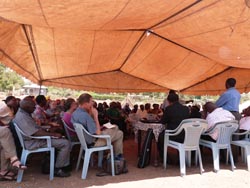 |
|
3 |
| Finally N2Africa Master Plans are ready for use |
 |
The N2Africa Master Plans are documents intended to foster a common approach across the five Core Countries. So far seven master plans have been developed. These are Agronomy, Dissemination, Monitoring & Evaluation and Data Management, Rhizobiology, Communication, Gender and Innovation platforms. The plans are designed to achieve the N2Africa Vision of Success and the objectives set out in the Research Framework of the approved project proposal. This means all Master Plans need to ensure timely delivery of the outputs and outcomes.
|
|
4 |
| The use of tablets and Short Message System (SMS) for data collection: Demonstration from case study in N2Africa-Ethiopia |
|
In the 2014 growing season, two digital data collection methods were explored in Ada’a and Damot Gale districts of Ethiopia. The first approach is using Google Nexus tablets by extension workers and research technicians to collect both agronomic and socio-economic data. The second approach is using SMS method in which farmers send information on agronomic practices using SMS (Crowdsourcing). ...
|
 |
|
5 |
| Training Youths from Borno State, Nigeria on Agribusiness |
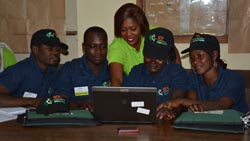 |
In August 2012, a group of Nigerian Youth Corp (NYSC) members, trained at the International Institute of Tropical Agriculture (IITA) Headquarters, Ibadan (Nigeria) established the IITA Agripreneurs (IYA) as an independent agribusiness enterprise involved in the production, processing and marketing that cuts across value chains of several crops as well as the production and marketing of vegetables and fish.
The IYA organized a training workshop on "Agribusiness, a Key to Productive Youth Engagement", last September. ...
|
|
6 |
| Effect of cattle manure, mineral fertilizer and Rhizobium inoculation on climbing bean production in Burera district, Rwanda |
|
Rwandans are among world’s top consumers of beans as it is a preferred legume across livelihood zones and wealth groups. This staple is considered as meat for the poor or a near complete food, mainly due to its nutritious nature: common beans contain proteins, resistant starch, dietary fiber, vitamins and minerals.
Although growing climbing beans involves tedious work, climbing types have the advantage of yielding three times more than bush beans. ...
|
 |
|
7 |
| N2Africa in the news |
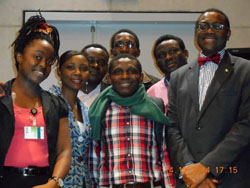 |
Short stories about Jeff Ehlers as key note speaker on November 13th in the CSIS conference and Comfort Ojo and colleague PhDs meeting Bill Gates and Dr Akinwunmi Adesina on November13th and 14th.
Photo: The Right Honourable Minister of Agriculture Dr Akinwunmi Adesina (right) with Wageningen University students (on the left Comfort Ojo)
|
|
8 |
| Using the search function on the N2Africa website |
The website is made more accessible recently. You will find the content is better organised and the search function has improved. To get the most out of your search you can use AND and OR searches. To assist you Marcel Lubbers wrote some guidelines for this function.
|
9 |
| Product development of NoduMax soyabean inoculant continues |
|
NoduMax is a new legume inoculant for soyabean recently developed at the IITA Business Incubation Platform and the N2Africa Project. The inoculant contains >1 x 109 Bradyrhizobium japonicum strain USDA 110 per g and is packaged in an alumino-laminate bag along with gum arabic adhesive and user instructions.
Photo: NoduMax team May 2014
|
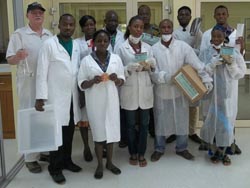 |
|
10 |
| Research prize for DR Congo at the 16th conference of African Association of Biological Nitrogen Fixation in Rabat Morocco |
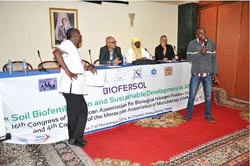 |
During this conference the last day of the congress, I presented summary results of my two papers and posters on "Improving shelf life of legume inoculant in East Africa". And ‟Performance of Indigenous Rhizobia Strains on grain yield of two Promiscuous Varieties of Soyabean in South-Kivu soil". ...
Photo: During presentation and discussion with the audience chaired by Prof. Felix Dakora
|
|
11 |
| N2Africa at the annual meeting of the CGIAR Consortium for Spatial Information |
|
At the end of September I attended the annual meeting of the CGIAR Consortium for Spatial Information (CSI). The meeting was supposed to be part of the African Agricultural GIS Week in Accra, Ghana but was relocated to ITC in Enschede due to Ebola fears.
The meeting provided an opportunity to show some of the spatial analysis work that we are conducting in N2Africa. I presented ...
|
 |
|
12 |
| Visit N2Africa Project Coordinator to DR Congo |
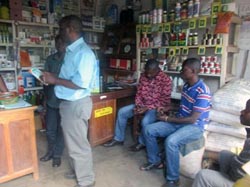 |
N2Africa coordinator Fred Kanampiu visited N2Africa activities in DR Congo from October 6th to 10th, 2014.
This article tells about the highlights of his visit.
Photo: Agrodealer shop Pharmacie Lobiko Bukavu
|
|
13 |
| Soyabean grain yield and seed quality under rain fed conditions in Sierra Leone |
|
Sierra Leone falls within the humid forest agro ecological zone. Based on meteorological data, type of vegetation, and length of growing period for crops under rain fed conditions, the country is divided into different agro climatic zones. As an incredibly versatile plant with different maturity groups, soyabean is adaptable to a wide range of climatic conditions. Date of planting exposes soyabean plants to environmental factors (water, temperature, relative humidity, and day length) ...
|
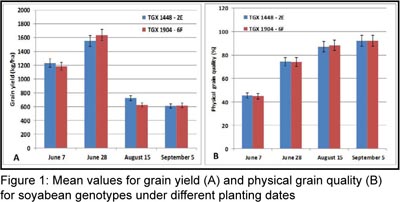 |
|
14 |
| Integrated management of cowpea insect pests in Sierra Leone |
 |
Cowpea is the second most important grain legume in Sierra Leone after groundnut. The grain is valued for its nutritive content and short cooking time, and also favoured by farmers because of its ability to maintain soil fertility through its ability to fix nitrogen. Despite the high potential for production, yields have been generally low. Total yield losses and crop failure may occur due to several factors including the use of local varieties by farmers, time of planting, low soil fertility and insect pests. ...
Photo: Maruca caterpillar on cowpea
|
|
15 |
| Autumn debate of the Wagenings Journalists’s cafe ‘the correct multimedia mix’ |
|
Ken Giller attended a debate for a journalist collective (link in Dutch only) on October 9th. Yael de Haan, teacher Crossmedial communication of the University of Applied Sciences of Utrecht, led a discussion about the added value of using multimedia as ways to reach specific target groups In the debate Ken Giller told why he made so many films for the N2Africa project. ...
|
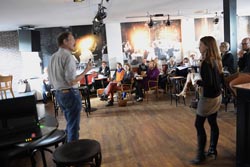 |
|
16 |
| New training materials |
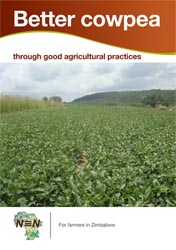 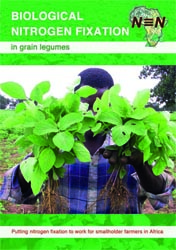 |
Half November we uploaded a number of new training materials for Training of Trainers and Lead Farmers. Most of these were written by N2Africa together with the African Soil Health Consortium. Photos show two of the cover pages. The booklets can be downloaded from our website and via the separate links.
|
|
17 |
| International Conference on Building a New Generation of Agricultural Scientists” held at Kenyatta University, Nairobi-Kenya (1st - 5th December, 2014) |
|
I was delighted to present a keynote address to roughly 250 budding young agricultural scientists at this international conference. Great to interact with such a talented group and we had lots of opportunities for photos! ...
Rechiatu Asei, Onawumi Olufisayo Adeyinka, Ken, Mavis Badu and Benedicta Essel (from left to right)
|
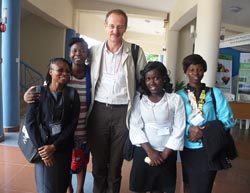 |
|
18 |
| MSc research in the Salima District, Malawi: Thesis report |
Hyejin Lee completed her MSc thesis entitled "Assessment of changes in households food availability, access, utilization and stability using farm stratification associated with the introduction of legume technology in Salima district, Malawi" at the University of Hohenheim, Stuttgart as part of an Erasmus exchange programme between Wageningen University and the University of Hohenheim early December.
|
19 |

















